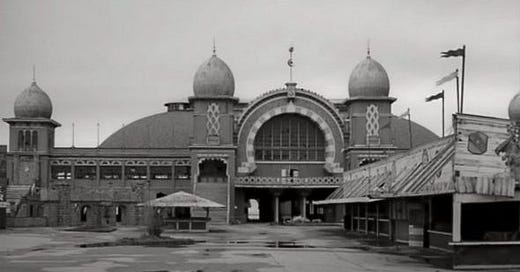Vaccines and the Deserted Amusement Park of the American Soul
I finally got mine. But for-profit hospitals are killing people to "get theirs."
After months of stressful waiting, a family member’s persistence got me a vaccine appointment at Six Flags, an amusement park whose slogan used to be, “It’s playtime!”
It’s probably old-school journalistic thinking, but I don’t like writing about myself. I especially don’t like writing about my health. When it comes to COVID-19, however, my health is an inseparable part of the story for me. Doctors tell me I’m at very high risk of life-threatening COVID complications.
I’ll spare you the tortuous process of trying to get a vaccination – a process made worse by Maryland’s dismal record of vaccine distribution. It’s enough to say that the private hospitals and pharmacies distributing the vaccine have displayed shocking levels of incompetence and insensitivity.
Private hospital systems have also abused their vaccine-fueled power. They have held vulnerable people hostage over small unpaid bills, endangering at least one life (and almost certainly more) for a couple of hundred dollars in revenue. And they’ve given preferential treatment to their own employees, even when they did not qualify for the vaccine, while people at risk waited (and some undoubtedly died).
I was also shocked to see privately-owned hospitals overrule the state and determine for themselves who was and was not allowed to receive the vaccine (for example, by deciding they would not move to the next phase of distribution when the state mandated it.) But then, this is symptomatic an inhumane and failed system that uses private organizations to execute public policy without adequate controls, even when lives are at stake.
A well-run nation would have used the internet – itself a public invention – to screen and prioritize people for vaccination, schedule appointments, and ensure follow-ups.
A well-run system would not have been forced to negotiate with private-sector pharmaceutical corporations for lifesaving technology – especially since at least one of the vaccines was developed at public expense and the other relied heavily on publicly-funded research.
Hey, better late than never, isn’t that what they say? Except, of course, for the half million who are already dead. And so, Six Flags it was: a mile-long line of cars snaking through the gnarled branches of bare trees, trees whose leafless branches revealed: the empty amusement park. A multicolored water slide and roller coaster in the distance, their pastel colors pale against the winter sky. Quonset huts. Orange cones. Public health workers. National Guard troops.
“Not apocalyptic at all,” as a family member said sarcastically. George Romero, where are you when we need you?
I’m grateful I finally received my first shot. I know I’m luckier than a lot of other people. But the delays, distress, and discomfort – far greater for others than for me – wouldn’t happen in a nation that had the right priorities and didn’t put the distraction of its workers over their health and safety. But then, that distraction helps the current system survive.
Meanwhile, it still seems as if we’ve been play-acting at a national emergency. Why doesn’t our sense of urgency seem a hundred times greater than it was after 9/11? Death is not a matter of simple arithmetic, of course. As Jewish and Islamic tradition puts it, a single death is the loss of a universe entire. We’ve had hundreds of thousands. Until we act more urgently to end the dying, our national soul will be as barren as an amusement park in winter.
Playtime is over.



